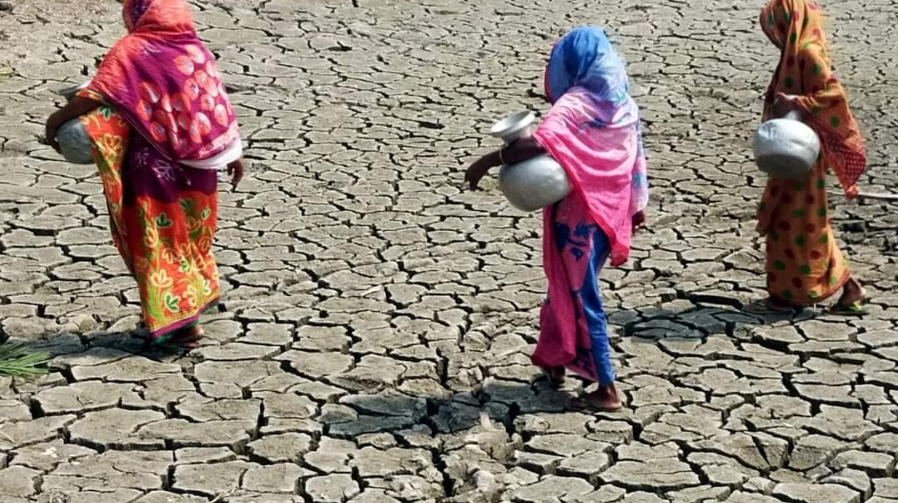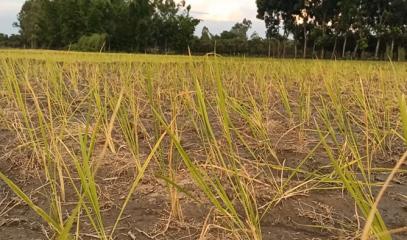World Environment Day: Desertification and drought, Bangladesh’s priorities
About 76 per cent of the land is degraded, while 86 per cent of the water used for irrigation is extracted from the ground. Droughts are expected to occur more frequently in the near future. Excessive groundwater use increases the risk of landslides. Caritas is pursing various projects to protect the land.
Dhaka (AsiaNews) – Soil restoration, desertification and drought resilience are the focus of this year’s World Environment Day, which is celebrated today. Such issues are critical for Bangladesh, in particular desertification and drought.
According to experts, the quality of 76 per cent of the country’s land is degraded by the effects of climate change, especially rising temperatures.
Water shortages are another problem, especially pronounced in the northern regions (Barendra) but which could reach the central and southern coastal regions.
According to the United Nations' World Water Development Report, 86 per cent of the water used for irrigation in the country is groundwater.
Bangladesh is among the top five countries for groundwater use in irrigation. Pakistan is first with 94 per cent; next are Saudi Arabia (92 per cent), India (89 per cent), and Syria (87 per cent), followed by Mexico (72 per cent) and the United States (71 per cent).
Climatologist and Senior Communication Officer at the Bangladesh Rice Research Institute (BRRI) Mohammad Kamruzzaman Milon, under the supervision of Prof Shabista Yildiz, lecturer in meteorology at Dhaka University, recently conducted a study on drought prospects in the country.
The in-depth analysis, published in Earth System and Environment (Springer), shows a significant progression of drought conditions (2060-2079), unless effective steps are taken to cut greenhouse gas emissions.
Drought rates could rise in Bangladesh’s northeastern region in the distant future, potentially reaching 14 per cent.
Between 2020 and 2079, maximum and minimum temperatures could increase significantly, with the minimum rising at a faster rate than the maximum.
As a result, the difference between the daily high and low will decrease, increasing heat stress in people, with possible negative repercussions on health and agriculture.
The maximum temperature will increase relatively more in the northern and southern areas, while the minimum will increase at a higher rate in coastal and eastern areas.
For Kamruzzaman, “There should not be a drought problem in a country where the annual average rainfall is over 2,000 millimetres. Our problem is the lack of proper water management. Therefore, emphasis should be placed on developing regional water management technologies."
The Soil Resource Development Institute conducted a study on declining soil quality, published in December 2022. Titled Bangladesh Land Degradation, 2020, it notes that, out of a total of 14.757 million hectares of land, 11.24 million or 76.1 per cent are subject to degradation.
Every year, an average of 27,000 hectares of land are lost due to the deterioration of the chemical quality of the soil, lowering of the water table, waterlogging, and drought.
Excessive groundwater extraction is also increasing the risk of landslides.
Arook Toppo, head of Ecological Conversation & Food Security, highlights the significant contribution made by Caritas Bangladesh to environmental conservation.
The initiatives by the Catholic charity focus on raising community awareness, building capacity, engaging youth, and promoting a culture of sustainability.
Through sustainable agricultural practices like vermicomposting, organic farming, and agroforestry, Caritas contributes to reducing environmental degradation.
Its efforts include afforestation and reforestation with tree-planting campaigns, community forests development, and mangrove restoration projects.
Caritas Bangladesh also supports the use of renewable energy sources, such as solar energy, as well as water management and conservation works through rainwater harvesting, drip irrigation, and recycling techniques.
30/10/2021 12:20
04/11/2021 09:58
31/03/2023 11:37
21/05/2024 14:40








.png)











